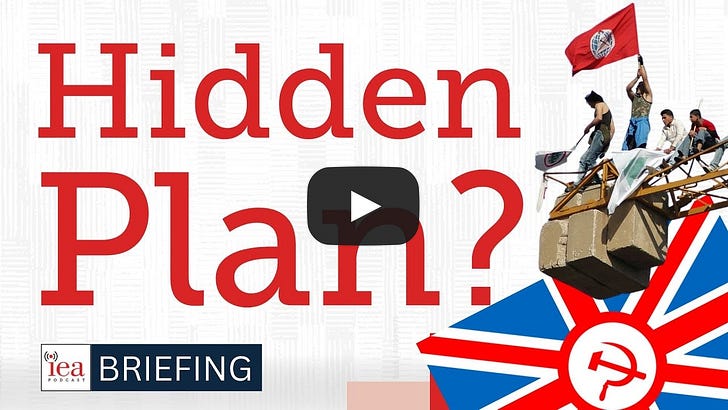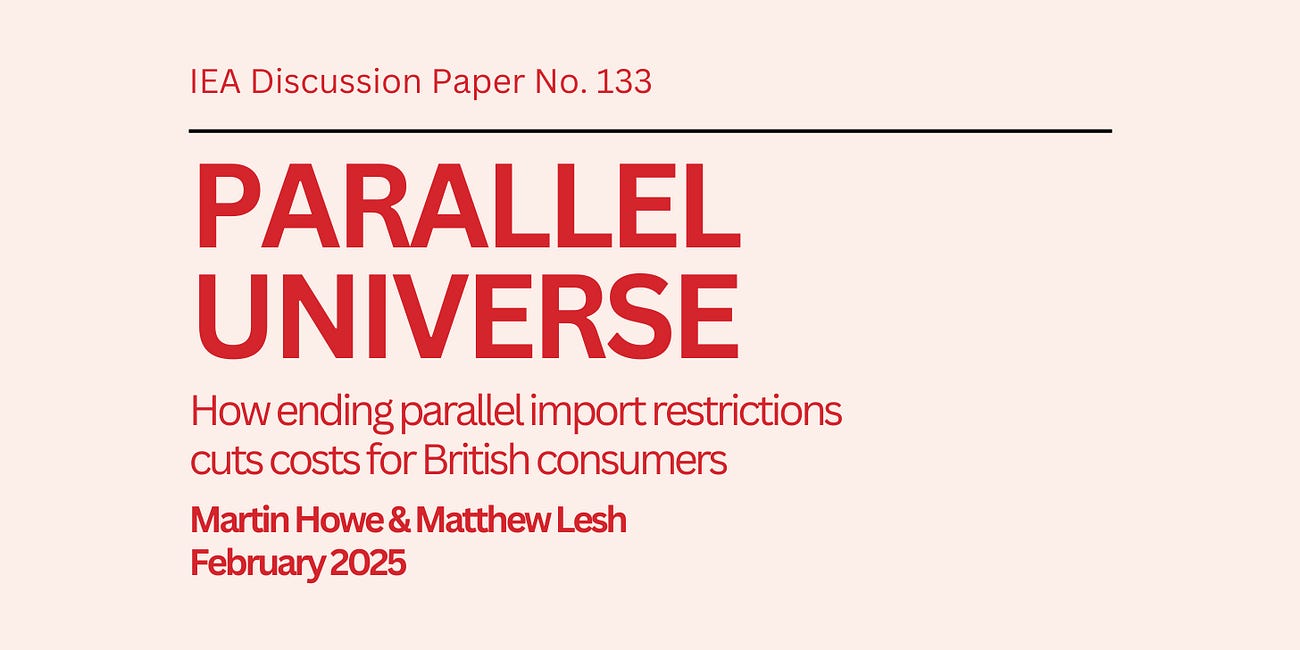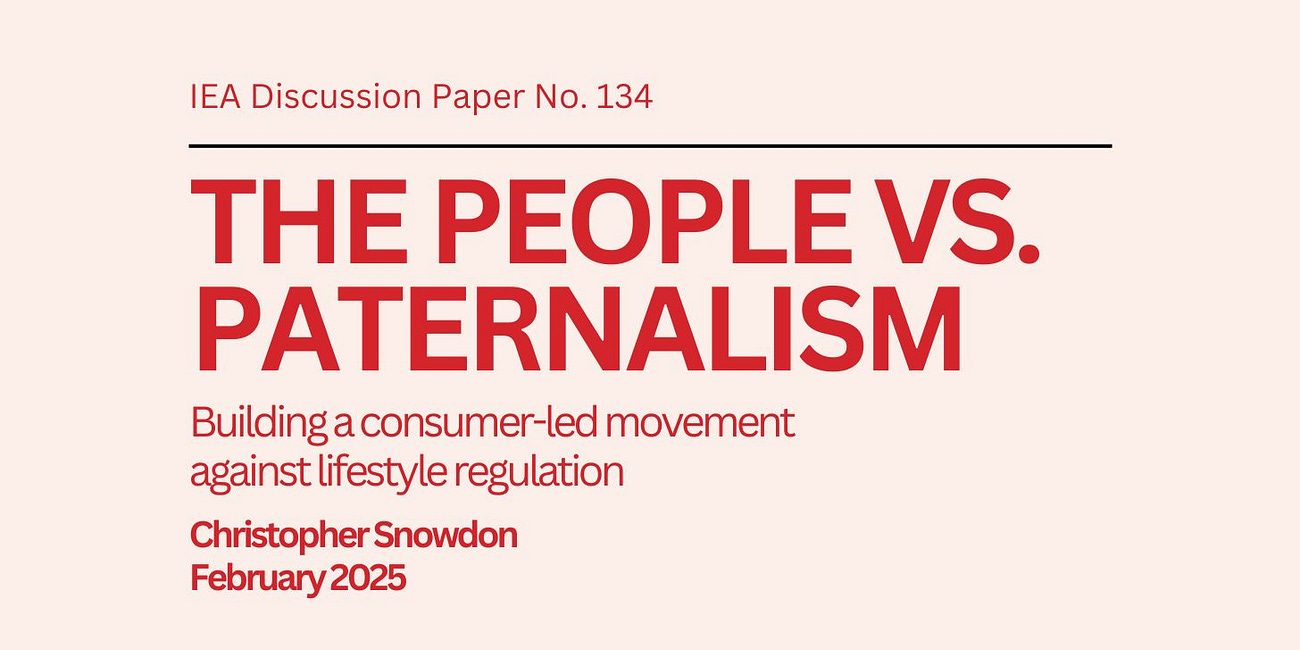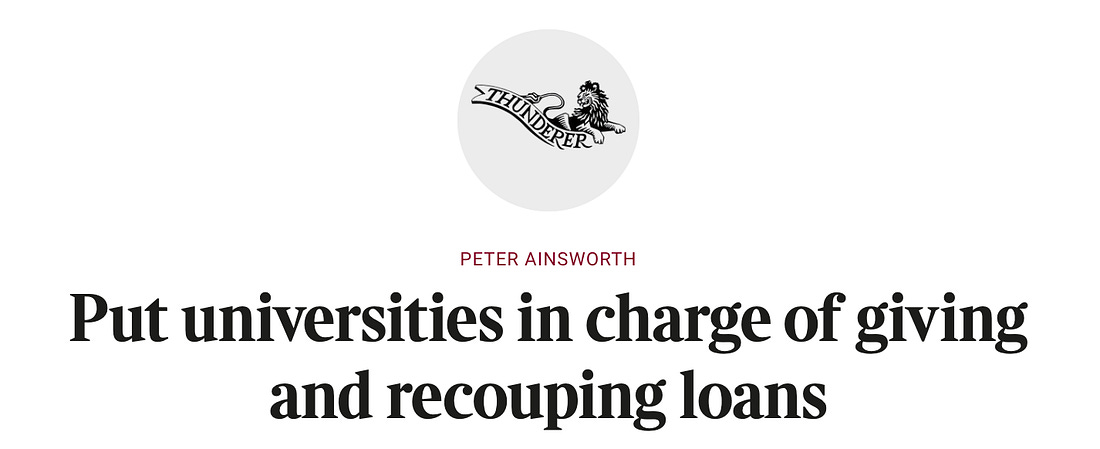|
 |
Should we cut aid to fund defence?
Plus: a consumer movement against the nanny state, abolishing trade restrictions, and fixing university funding
In today’s newsletter:
Should overseas aid be cut to fund more spending on defence?
The people vs paternalism
One quick fix to cut prices for consumers and the NHS
and more….
This week the Prime Minister announced that UK defence spending would be raised to 2.5% of national income in 2027, funded by cutting overseas aid. The politics around this switch may be controversial, but the economics is relatively straightforward.
First, defence is a textbook example of a ‘public good’ which cannot be left to the market. In particular, it is ‘non-excludable’, meaning that no-one in the country can be prevented from benefiting even if they fail to contribute to the cost. This ‘free rider’ problem limits the incentive for private firms to provide defence services direct to consumers, so the state has to step in with mandatory taxation.
Overseas aid can also be a ‘public good’ too – at least, those projects which are not wasteful, or actually counter-productive. UK taxpayers might be better off too if people living in other countries are healthier (fewer pandemics), richer (more trade), or happier (fewer asylum seekers, terrorists, and hostile states).
But these benefits are still felt primarily in these other countries, and overseas aid does more often come down to pure altruism. It is therefore more appropriate to fill any funding gaps with private charity rather than state compulsion.
Second, the switch from overseas aid to defence spending could provide a small net boost to the UK economy. This is about the ‘fiscal multipliers’, or the impact that an increase in government spending might have on overall national income.
The multipliers for defence are low compared to, say, spending on infrastructure, and the impact on the level of GDP will fade over time. But compared to overseas aid, more of the defence budget is, of course, spent at home.
Third, the switch will not worry the bond markets, which is important given the vulnerability of the public finances to even small increases in the cost of borrowing. Businesses and consumers may be reassured too that the seemingly inevitable increases in defence spending are not being funded by further tax hikes, or cuts in local services.
This leaves plenty of questions unanswered. What is the appropriate amount of national income to spend on defence? What will count as ‘defence spending’, and could the existing budget be used more efficiently? Will an increase in spending (inputs) actually improve defence capabilities (outputs), and ultimately make us safer (the desired outcome)?
More positively, will higher defence spending in the UK have additional benefits, such as encouraging allies to raise their spending too, and maintaining good relations with the US?
In short, there is a lot to consider here. But at first sight, the switch from overseas aid to defence does makes sense.
Julian Jessop
Economics Fellow
P.S. The best way to never miss out on IEA work, get access to exclusive content, and support our research and educational programmes is to become a paid IEA Insider.
IEA Podcast: Executive Director Tom Clougherty, Energy Analyst Andy Mayer, and Director of Communications Callum Price, discuss defence spending, climate five-year-plans and central bank independence, IEA YouTube

NEW REPORT 1: Abolish import restrictions to cut costs for consumers and the NHS
Brits are paying too much for electronics, beauty products, pharmaceuticals and books, according to a new discussion paper from the Institute of Economic Affairs.
Under current rules, British consumers are banned from accessing cheaper, branded goods from outside of the European Union. These rules restrict parallel imports, which are goods brought into the UK by third party traders, normally without the consent of the intellectual property rights holder. Parallel import restrictions (PIRs) allow manufacturers to segment markets and maintain higher prices.
According to the paper’s authors, leading intellectual property barrister Martin Howe KC and policy analyst Matthew Lesh, allowing these imports would lower prices, boost consumer choice, and help security of supply, including for essential medicines. It would save money for both consumers and public services like the NHS.
They quote a range of evidence that shows cutting these rules would intensify competition, lower prices, expand consumer choice, and improve supply chain flexibility. One study found that where they are not restricted, parallel imports had saved the NHS €986.2m (£819.3m) over five years through lower prices for pharmaceuticals.
Martin Howe KC, report co-author and leading intellectual property barrister said:
“Trade mark rights are meant to allow brand owners to stop deception or confusion in the market place. But an EU rule we still haven't reformed 5 years after leaving lets brand owners use these rights to keep their own genuine goods from coming into the UK market from the rest of the world. This allows multinationals to overcharge UK consumers compared with elsewhere and we should not allow our intellectual property laws to be used to suppress a freely competitive market."
Matthew Lesh, report co-author and Public Policy Fellow at the Institute of Economic Affairs said:
"Brits have been paying far too much for Levi's jeans, Chanel No. 5 and iPhones for too long. Outdated import restrictions act as an artificial tax, inflating prices and boosting corporate profits at our expense. Now, after Brexit, it makes no sense to welcome imports from the EU while blocking them from elsewhere. It's high time we level the playing field, let competition work for us, and put money back in people's pockets."
Labour considers scrapping EU ‘import tax’ costing consumers and NHS millions, The Sunday Telegraph
Axe the EU’s import tax to save consumers money, Martin Howe in CityAM
What Levi’s jeans can teach us about trade, Matthew Lesh in CapX
Watch Martin Howe discuss the report on the IEA YouTube

NEW REPORT 2: Consumers should fight back against the nanny state
Consumer groups should offer discounts and other financial benefits to build support for consumer interests in a sphere too dominated by ‘public health’ campaigners, a new paper published by the Institute of Economic Affairs argues.
Public health activists continuously place pressure on the government to regulate how we live our lives. They justify bans, new taxes, and advertising restrictions, all intended to protect ‘the public’, and frame the debate as ‘the industry’ versus ‘public health’. The latest round of regulations, including the Tobacco and Vapes Bill, are passing through Parliament swiftly on the back of this campaigning. These regulations increase costs and diminish the freedom of everyday consumers.
In ‘The People Vs. Paternalism’, Dr Christopher Snowdon explains how small, well-organised activist groups overwhelm the dispersed and fragmented voices of the ordinary consumers. These groups are often funded by the government and have a financial incentive to campaign for new restrictions on freedom while consumer groups have few resources and suffer from the ‘free rider’ problem.
Snowdon suggests a solution: a consumer-led movement that attracts members by offering selective incentives. By offering discounts, access to exclusive events and other perks, grassroots coalitions of consumers could emerge and fight for personal freedom.
Dr Christopher Snowdon, Head of Lifestyle Economics at the Institute of Economic Affairs and the author of the report, said:
“Consumers are at a disadvantage when faced with professional, state-funded neo-prohibitionists. Ordinary people simply do not have the time or money to effectively defend their interests. This report offers some lessons from economics to anyone who wants to resist the encroaching nanny state. Give people direct incentives to take collective action and they will join the fight. Millions of consumers deserve to be heard.”
How to fight back against the nanny state, Chris Snowdon in The Spectator
Public urged to 'fight back' against nanny state bans on smoking and sugar, The Daily Express
News, Views & Upcoming Events
Economic Affairs is free! The latest edition of Economic Affairs, the academic journal co-published by the Institute of Economic Affairs and the University of Buckingham, is fully accessible without a subscription on the IEA Website
Britain’s decline and how to reverse it, Callum Price interviews President of the Institute of Free Trade Lord Hannan on the IEA YouTube

Pay universities to educate, not recruit. Peter Ainsworth argues for systemic reform of university funding to deliver better for students, taxpayers and institutions, in The Times
Time for a serious rethink on energy, Andy Mayer discussing carbon budgets on GB News
Visions from a socialist future, Kristian Niemietz discusses an old socialist plan for Britain, and what it tells us about socialism today, IEA YouTube

You’re currently a free subscriber to Insider. For the full experience, upgrade your subscription.
Paid subscribers support the IEA's charitable mission and receive special invites to exclusive events, including the thought-provoking IEA Book Club.
We are offering all new subscribers a special offer. For a limited time only, you will receive 15% off and a complimentary copy of Dr Stephen Davies’ latest book, Apocalypse Next: The Economics of Global Catastrophic Risks.





![[INVITATION] Not Invented Here](https://substackcdn.com/image/fetch/w_1300,h_650,c_fill,f_auto,q_auto:good,fl_progressive:steep,g_auto/https%3A%2F%2Fsubstack-post-media.s3.amazonaws.com%2Fpublic%2Fimages%2F8a6321e0-fe77-45a1-b638-e0b31a4b8112_1920x1080.jpeg)
![[INVITATION] IEA In Conversation with Mario Rizzo](https://substackcdn.com/image/fetch/w_1300,h_650,c_fill,f_auto,q_auto:good,fl_progressive:steep,g_auto/https%3A%2F%2Fsubstack-post-media.s3.amazonaws.com%2Fpublic%2Fimages%2Ff1b0f43d-61f6-4293-94b9-f4e48b4df388_1920x1080.png)